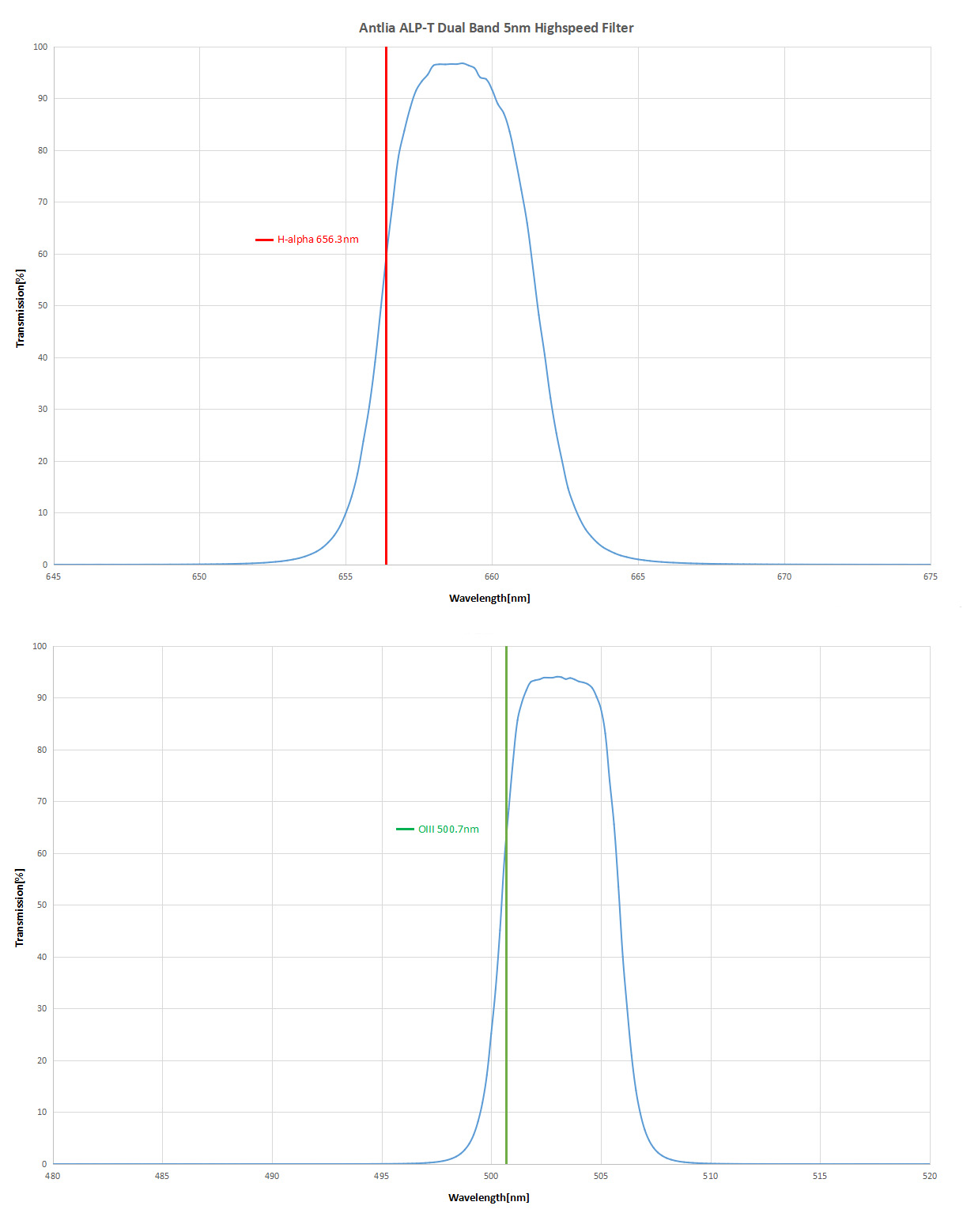Antlia ALP-T Dual Band Ha+OIII 5nm Highspeed Filter
ALP-T Dual Band 5nm Highspeed Filters are further optimized to work with high-speed imaging systems by shifting slightly the passband and center wavelength. Using these highspeed filters between optics f/2.2 and f/3.6 shows much stronger and more contrasted in nebulae imaging compared to the standard version.
For optics f-ratios slower than f/3.6, the standard ALP-T Dual Band 5nm filter is highly recommended. Meanwhile, if you seek the best possible performance with any optics faster than f/2.2, the highspeed version is the best choice.
But keep in mind, the blue shift data by the computer simulation indicates narrowband filter shifts its bandwidth to shorter wavelengths with faster optics than f/2, transmission at the emission wavelength may decrease perhaps 15%-20%. Although the Antlia ALP-T highspeed filter has similar transmission rates reduction in the H-a and OIII when the filter is used on fast optics, based on current standard version users’ data, it is evident that the filter still has the high performance of increase in emission nebula contrast and minimized halo.
The highspeed version price is the same as the standard filters and double benefits for the high-speed optics users. Worth mentioning is that Antlia inspected and measured products piece by piece with one of Agilent Cary’s professional spectrophotometer, resolution/slit width is up to 0.2nm, which make us provide highly reliable and consistent products to you.
The Antlia ALP-T dual band 5nm series filter is a dual line-pass filter that was designed to be used primarily with one-shot color (OSC) cameras such as DSLR’s and astronomical OSC cameras. It can also be used as a narrowband filter for monochrome cameras to save imaging time. The advanced multi-coatings on our ALP-T ultra dual band filter effectively isolate the red Ha and the blue-green OIII lines light from emission nebulae, with almost total suppression of optical density (OD)4.5 on unwanted wavelengths from light pollution, moonlight, and airglow. The result is that our ALP-T dual band 5nm filter creates a superior signal-to-noise ratio and better contrast in your images.
The filter enables the capture of the two main emission nebulae bands at the same time, whilst suppressing unwanted light pollution. It enables you to capture cleaner data and reduces the post-processing efforts to isolate faint details from the background light pollution.
Application and Performance:
Designed especially for fast astronomy optics, in particular f-ratios f/2.2 to f/3.6
Engineered specifically for use with DSLR, CMOS, and CCD color cameras
Suppression of optical density (OD)4.5 on unwanted wavelengths adds signal-to-noise
Extremely steep bandpass edges minimize internal reflections
Ideal flat-top and moderate bandpass reducing spectrum down shifts
Ion Gun Assisted Deposition coating technology on the double-sided polished substrate making it the most consistent and accurate light pollution suppression filter
Designed to suppress artificial lighting from Bortle scale 1 to Bortle scale 8
Near IR (NIR) is blocked up to 1050nm
Not Recommended:
Solar imaging
Night visual observation
Not Permitted:
DO NOT LOOK AT THE SUN WITH THIS FILTER
Serious eye damage will result if you fail to observe the warning
Technical Specifications
|
Hydrogen-alpha |
Oxygen III |
| FWHM |
5nm |
5nm |
| CWL (Central Wavelength) |
657.8nm |
502.2nm |
| Peak Transmission |
88% |
82% |
| Blocking |
≥OD4.5 @ 300-1050nm |
| Filter Thickness |
2mm+/-0.05mm |
Filter Ring:
2” (M48*0.75)
Ultra-thin filter cell to minimize vignetting by maximize possible clear aperture
Black Anodized Finish
Laser Engraving No Fading
Spectrum Curve:
In the Box
ALP-T Highspeed Filter
Warranty & Manuals
Antlia 3-Years Warranty Against Delamination






